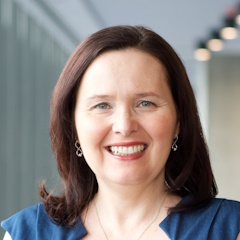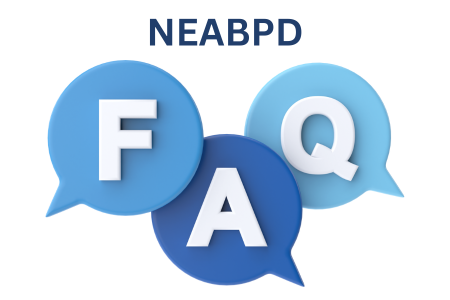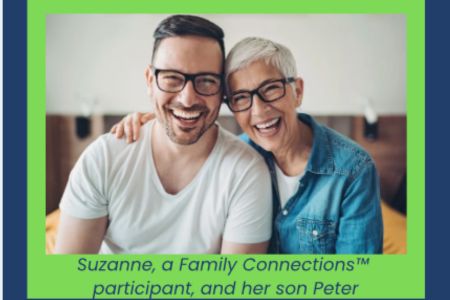Compassion: From Hopelessness to Deep Connection
Liz Santamorena is the mother of Nico (pronouns they/them/theirs), her adult child who was diagnosed with BPD at age 21. Liz and Nico shared their perspectives about their BPD journey at the 2024 annual BPD conference co-sponsored by NEABPD and Yale.
For Liz, the journey began when Nico was just nine years old. At the time, Liz felt Nico’s anxiety warranted professional help. Taking that initial step turned into more than a decade of trials and tribulations as she search for the right providers, medication(s), and treatment(s) for her child. She described how her journey was riddled with stigma, confusion, frustration, and desperation. For years, her efforts resulted in only minor and temporary improvements in Nico’s mental health. At their breaking point, Liz got Nico to agree to a residential treatment program where they were first diagnosed with BPD. After 11 years of an alphabet soup of diagnoses, this was the first one that made sense. With this more fitting diagnosis, Liz was able to find resources… (continue reading).

Access: We Have Effective Treatments, People Can’t Access Them

Julie Hawley, is an NEABPD Family Connections™ Leader and Advocacy Committee Member.
Who wouldn’t want Julie Hawley on their side? Tired of hearing that there are evidence-based treatments, like DBT, for BPD, and they are either unavailable (too few, too far away) or inaccessible (Medicaid and private insurance won’t pay) or both, Julie went to work. First for her own family, where she saw the transformative effects of DBT and won insurance coverage! But she didn’t stop there. She says, “You fight for your kid, and when they no longer need it, you fight for other people’s kids.”
Julie and the NEABPD Advocacy Committee are working through the steps to require insurance companies to cover DBT and other evidence-based treatments for BPD nationally. It’s not for the faint of heart. There are meetings, presentations, documents, codes, and more hoops to jump through. Julie, the NEABPD Advocacy Committee and like-minded organizations are committed to doing whatever is needed for as long as it is needed to make change happen. Julie makes it clear that YOU ARE AN IMPORTANT PART OF THIS EFFORT. When you get an advocacy email from NEABPD to write a letter or make a call, know that your contribution matters.
Your relationship with yourself is the most important of your life. This is because you are the only person that you can count on to be with you through all the ups and downs and until the end.
A breakthrough moment for me was feeling how rewarding it was to take care of myself. It was a distinct sensation: I didn’t get the emotional high of feeling like someone’s priority—but I also didn’t get the emotional (and often physical) low of waiting for someone else to meet my needs.
Many people with BPD experienced some form of real or perceived neglect – (some didn’t) – and it can be tempting to wait around for a superhero to rescue you, repair those childhood wounds, and nurture you forever after.
I have news for you: you’re the superhero. You can give yourself the care that you want and need, and it will eventually become second nature.
Don’t be discouraged! The pay-off is enormous. Feeling safe in my own arms is a feeling that I wouldn’t trade for anything in the world.
About the Author: Saadia is a graduate student with lived experience of borderline personality disorder.

Evidence: New Published Research Highlighting Family Connections™
 Borderline Personality Disorder (BPD) has a strong impact not only on patients’ lives but also on their families. Furthermore, an invalidating environment is one of the critical factors in the etiology of BPD. A study to be published in the September issue of Family Process, “Family Connections: The Impact of an Education Program for Carers of Individuals with Borderline Personality Disorder in Italian Mental Health Services”, evaluated the impact of the Family Connections™ (FC) program on burden, grief, and other clinical variables in 202 caregivers and identified the profiles of participants who improved/deteriorated their levels of burden and grief. Generalized linear mixed models were used to evaluate pre-post changes. In addition, the researchers tested whether reductions in burden and grief were associated with age, gender, and the improvements in other clinical variables.
Borderline Personality Disorder (BPD) has a strong impact not only on patients’ lives but also on their families. Furthermore, an invalidating environment is one of the critical factors in the etiology of BPD. A study to be published in the September issue of Family Process, “Family Connections: The Impact of an Education Program for Carers of Individuals with Borderline Personality Disorder in Italian Mental Health Services”, evaluated the impact of the Family Connections™ (FC) program on burden, grief, and other clinical variables in 202 caregivers and identified the profiles of participants who improved/deteriorated their levels of burden and grief. Generalized linear mixed models were used to evaluate pre-post changes. In addition, the researchers tested whether reductions in burden and grief were associated with age, gender, and the improvements in other clinical variables.
Variances were analyzed to evaluate long-term changes in a sub-sample of caregivers having completed assessments at three-time points. FC program participants showed significant reductions in burden, grief, depression, global psychological distress, and anger. Caregivers reporting reduced depression were more likely to improve in both burden and grief. Moreover, younger participants showing increased depression had a 72.7% probability of being part of the improvement in burden and a 66.7% probability of being part of the improvement in grief. A decrease in depression and having a younger age were associated with positive gains for caregiving burden and grief. Longitudinally, positive changes in burden and grief, as well as decreased depression, global psychological distress, and suppressed anger, were maintained at the 4-month follow-up. In contrast, scores on outwardly expressed anger shifted towards values similar to those observed at pre-intervention.
Thank you to our friends in Italy for conducting this critical study.
About NEABPD – Answering some FAQs

We fight the stigma of BPD / chronic emotion dysregulation, educate clinicians and raise awareness of the symptoms so that patients can receive effective and early treatment. For those loving someone with BPD, we see participation in Family Connections™ helps break patterns of chaotic relationships, isolation, and invalidation. NEABPD provides Family Connections courses in twenty-eight countries around the world.
Our board and staff members are located around the country and are all knowledgeable about BPD / chronic emotion dysregulation. We are comprised of people who have lived experience (have the diagnosis or traits), loved experience (family members who have a loved one with BPD or traits of BPD), or learned experience (clinicians and researchers who specialize in BPD or chronic emotion dysregulation).
76% of our board and staff have lived or loved experience. 29% of our board are clinicians or researchers. (We have 1 member who falls into both categories.)
95% of the staff and board have taken the Family Connections course, 76% have been trained as leaders, and 57% have led a class within the past year.
NEABPD is here for all those who live with BPD, those who love them and care for them including family members and clinicians. We are working to ensure high-quality treatment is accessible and that people have the skills they need to support their loved ones. And we are creating a community that understands the challenges and honors the gifts of people living with BPD.
Why I give to NEABPD

The Family Connections™ course didn’t just change my relationship with my son, it transformed me. It was like I took off one set of glasses and put on another: one of understanding, compassion, and empathy. The skills I learned enabled me to mend my relationship with my son, but they also changed how I show up in the world. I now approach life with validation and an open heart.
I donate to NEABPD because I know every penny received “pays it forward” and helps others just as I was helped. NEABPD is a small organization with no government funding or grants. 92% of funds donated to NEABPD come from past and present Family Connections™ participants and organizations, companies and foundations they are associated with.
The continuation of the Family Connections™ Course, which is offered free of charge, relies solely on the generosity of people like us. Our understanding of its value and willingness to support it through donations are what keep this life-changing program going.
I am a firm believer that the Family Connections™ course is not just about learning skills, it’s about personal growth. Those who complete the course emerge as more evolved, kinder, and better individuals Their transformation is not just personal; it extends to the world around them, creating a ripple effect of understanding and compassion.
Past participants go on to create a less stigmatized world around BPD and chronic emotion dysregulation. The ripple effect is enormous. I can think of no better way to spend my charitable dollars than helping to alleviate the suffering of other people who have been down the same difficult road as I have.

Recent Comments